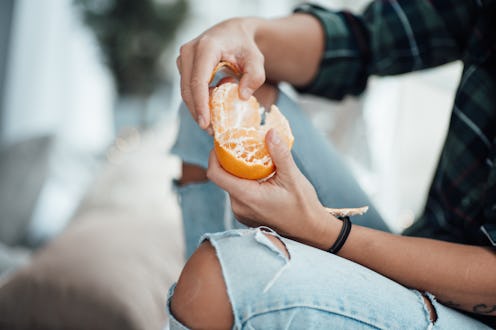Health
TikTokers Say Burnt Oranges Can Help Get Taste Back Post-COVID
There’s actually some science to it.

After recovering (mostly) from COVID-19, a lot of people are discovering that a few side effects tend to stick around: coughing, wheezing, and most disconcertingly, loss of taste. Au revoir, spicy noodles; auf wiedersehen, expensive chocolates. People are, understandably, trying everything to try and get their tastebuds back online for the holiday season — and one trend going around TikTok involves eating burnt oranges to recover lost taste. As in, charring citrus and then consuming the flesh inside, in an attempt to "miraculously" restore taste and smell. While it might smell delicious, there's no proof that charred oranges are a definite remedy for post-COVID taste loss, but there are some intriguing studies in the works.
Post-COVID taste loss is pretty common. A study published in Annals of Internal Medicine found that up to 56% of COVID-19 patients had trouble tasting at least one of the salty, sour, sweet, or bitter flavor groups, while a Mayo Clinic analysis found that nearly 40% of COVID patients saw their ability to taste vanish, at least for a little while.
It's still not clear what exactly COVID does to wreak this havoc on your dining habits. Smell and taste are intricately connected, and it seems COVID-19 targets particular cells in your nose, damaging them temporarily. Vanderbilt University Medical Center notes that losing smell and taste might be the only sign some people have of their COVID infection.
So is there any science to the cure? Dr. Omid Mehdizadeh M.D., an otolaryngologist at Providence Saint John's Health Center, tells Bustle, the idea probably comes from smell retraining therapy, an experimental process that tries to help people regain their sense of smell. "Potent aromas including charred oranges, lemon zest, eucalyptus and cloves can be smelled three to four times a day for three to four months," he says. One burned orange isn't enough to make a difference, but a month's worth may be a different story.
A study published in 2020 in The Laryngoscope found that smelling strong substances — like anise, eucalyptus, cloves, lemon, or citronella — helped people who'd lost their sense of smell due to other, non-COVID viruses. "In cases of post infectious loss of smell, smell retraining therapy has been shown to offer some recovery," Dr. Mehdizadeh says. There's a clinical trial in the U.S. underway to see if this might help people with post-COVID syndrome as well, but there are no results yet.
If you do suddenly taste something when you're devouring a singed orange, it may be that you've already begun to recover, Pamela Dalton, Ph.D., a researcher at the Monell Chemical Senses Center, told TODAY. "People often don't know how much smell they lost, so if they do something that's really intense, like burning an orange peel, that will give you an extraordinary sensation, you may have already had an ability, but you've essentially shocked your system into smelling something strong," she said.
The good news is that your smell and taste will likely return on their own. A study from the British Medical Journal found that 90% of people who couldn't smell or taste a thing during their COVID infection recovered within about four weeks, as the cells repaired themselves. But the jury's out on whether a burned orange will do much to speed things along.
Expert:
Dr. Omid Mehdizadeh M.D.
Studies cited:
Agyeman, A. A., Chin, K. L., Landersdorfer, C. B., Liew, D., & Ofori-Asenso, R. (2020). Smell and Taste Dysfunction in Patients With COVID-19: A Systematic Review and Meta-analysis. Mayo Clinic proceedings, 95(8), 1621–1631. https://doi.org/10.1016/j.mayocp.2020.05.030
Lechien, J. R., Chiesa-Estomba, C. M., Hans, S., Barillari, M. R., Jouffe, L., & Saussez, S. (2020). Loss of Smell and Taste in 2013 European Patients With Mild to Moderate COVID-19. Annals of internal medicine, 10.7326/M20-2428. Advance online publication. https://doi.org/10.7326/M20-2428
Liu, D. T., Sabha, M., Damm, M., Philpott, C., Oleszkiewicz, A., Hähner, A., & Hummel, T. (2020). Parosmia is Associated with Relevant Olfactory Recovery After Olfactory Training. The Laryngoscope, 10.1002/lary.29277. Advance online publication. https://doi.org/10.1002/lary.29277
Walker, A., Pottinger, G., Scott, A., & Hopkins, C. (2020). Anosmia and loss of smell in the era of covid-19. BMJ (Clinical research ed.), 370, m2808. https://doi.org/10.1136/bmj.m2808
Whitcroft KL, Hummel T. Olfactory Dysfunction in COVID-19: Diagnosis and Management. JAMA. 2020;323(24):2512–2514. doi:10.1001/jama.2020.8391